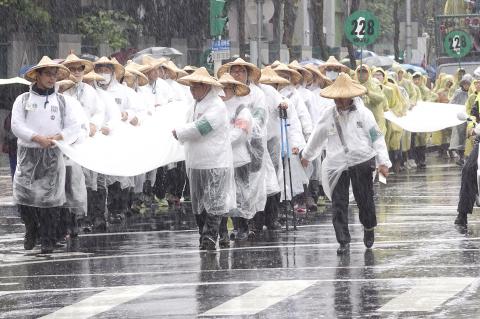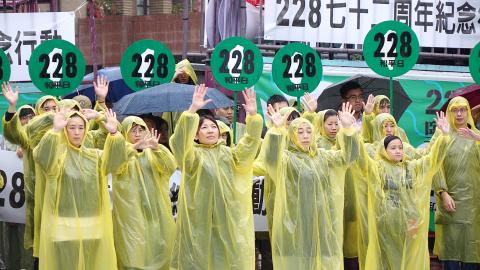Cold weather and steady rain did not deter hundreds of people from more than 60 civic groups who marched in downtown Taipei yesterday to commemorate the 72nd anniversary of the 228 Incident.
The groups, which included the 228 Memorial Foundation, the Presbyterian Church in Taiwan, the Nylon Cheng Liberty Foundation and the Taiwan Association for Human Rights, gave young leaders the spotlight by letting them lead the march.
“Let us be proud of Taiwan and our democracy,” marchers declared as they urged people not to forget the victims of atrocities and political oppression during the White Terror era.

Photo: George Tsorng, Taipei Times
The 228 Incident was a crackdown launched by the Chinese Nationalist Party (KMT) against civilian demonstrations following the indiscriminate killing of a bystander in an angry crowd in Taipei on Feb. 27, 1947; it is considered the start of the White Terror era.
During the march, teams of people held up white sheets, and walked in somber silence as though in a funeral procession, while audio recordings of the names of those killed during the massacre were played.
“The march started at the site of conflict that sparked the 228 Incident, the Tianma Tea House (天馬茶房), so that we could go back in time and uncover history and the truth of what took place, and transitional justice can be implemented,” Nylon Cheng Liberty Foundation executive Cheng Ching-hua (鄭清華) said.

Photo: George Tsorng, Taipei Times
Pastor Lin Wei-lien (林偉聯), of the Presbyterian Church’s church and society committee, said that the 228 Massacre left Taiwanese society in pain.
“We hold the march and related activities each year so that people do not forget, and to enable the different sectors of society to have more rational and open dialogues about this part of our history,” he said.
“This history must not be lost. We shall pass it onto the next generation, to become the common history and legacy of Taiwanese people,” he said.
“It is not just for the older generation — the younger generation must continue to commemorate the 228 Incident,” he added.
The young people picked to lead the march were all university students, including Chu Chen (朱震), Yu Teng-chieh (游騰傑), Hsu Kuang-tse (許冠澤), Liao Chung-lun (廖崇倫) and Cheng Shau-yun (鄭韶昀), who in 2015 organized nationwide protests over the then-KMT government’s plan to make high-school curriculum guidelines and textbooks more “China-centric.”
At the end of the march a prayer service was held and flowers were laid to commemorate the victims.
Participants gathered in front of the Executive Yuan, and Chu, representing the young people, read a statement.
“We believe that the phrase: ‘We are Taiwanese, not Chinese’ encapsulates the greatest common factor shared among people of our generation. We do not, and will never, consider Taiwan a part of China,” the statement said.
“We cannot remain silent and we cannot withhold our actions, because eventually we have to face the threat from China. What we can do is to hold each other by the hand. In this darkness, I feel as scared as you, but I will not let go of you,” it said.
“We will walk forward step by step, believing that we will soon see the light. Let us defend the values of democracy, let us be proud of Taiwan and our democracy,” the statement said.
“We hope that one day when we talk about the 228 Incident, we will no longer constrain ourselves to the peace declaration, history of oppression, or non-violent movements of intellectual elites. We may also recognize the bloody history of armed resistances of ordinary people,” it said.
“Let transitional justice enlighten the young generation. By inspecting the fabric of small things, let us feel the generosity and mercifulness of the subtropical island, and feel the scents of history, rivers and the ocean,” it said.
“From countless struggles of our ancestors, we understand the tradition of recalcitrance, and the character of bravery and perseverance embedded in Taiwanese people. Finally, in the battles of the real world, we will continue to be fearless,” it said.

Seventy percent of middle and elementary schools now conduct English classes entirely in English, the Ministry of Education said, as it encourages schools nationwide to adopt this practice Minister of Education (MOE) Cheng Ying-yao (鄭英耀) is scheduled to present a report on the government’s bilingual education policy to the Legislative Yuan’s Education and Culture Committee today. The report would outline strategies aimed at expanding access to education, reducing regional disparities and improving talent cultivation. Implementation of bilingual education policies has varied across local governments, occasionally drawing public criticism. For example, some schools have required teachers of non-English subjects to pass English proficiency

‘FORM OF PROTEST’: The German Institute Taipei said it was ‘shocked’ to see Nazi symbolism used in connection with political aims as it condemned the incident Sung Chien-liang (宋建樑), who led efforts to recall Democratic Progressive Party (DPP) Legislator Lee Kun-cheng (李坤城), was released on bail of NT$80,000 yesterday amid an outcry over a Nazi armband he wore to questioning the night before. Sung arrived at the New Taipei City District Prosecutors’ Office for questioning in a recall petition forgery case on Tuesday night wearing a red armband bearing a swastika, carrying a copy of Adolf Hitler’s Mein Kampf and giving a Nazi salute. Sung left the building at 1:15am without the armband and apparently covering the book with a coat. This is a serious international scandal and Chinese

TRADE: The premier pledged safeguards on ‘Made in Taiwan’ labeling, anti-dumping measures and stricter export controls to strengthen its position in trade talks Products labeled “made in Taiwan” must be genuinely made in Taiwan, Premier Cho Jung-tai (卓榮泰) said yesterday, vowing to enforce strict safeguards against “origin laundering” and initiate anti-dumping investigations to prevent China dumping its products in Taiwan. Cho made the remarks in a discussion session with representatives from industries in Kaohsiung. In response to the US government’s recent announcement of “reciprocal” tariffs on its trading partners, President William Lai (賴清德) and Cho last week began a series of consultations with industry leaders nationwide to gather feedback and address concerns. Taiwanese and US officials held a videoconference on Friday evening to discuss the

PERSONAL DATA: The implicated KMT members allegedly compiled their petitions by copying names from party lists without the consent of the people concerned Judicial authorities searched six locations yesterday and questioned six people, including one elderly Chinese Nationalist Party (KMT) member and five KMT Youth League associates, about alleged signature forgery and fraud relating to their recall efforts against two Democratic Progressive Party (DPP) legislators. After launching a probe into alleged signature forgery and related fraud in the KMT’s recall effort, prosecutors received a number of complaints, including about one petition that had 1,748 signatures of voters whose family members said they had already passed away, and also voters who said they did not approve the use of their name, Taipei Deputy Chief Prosecutor